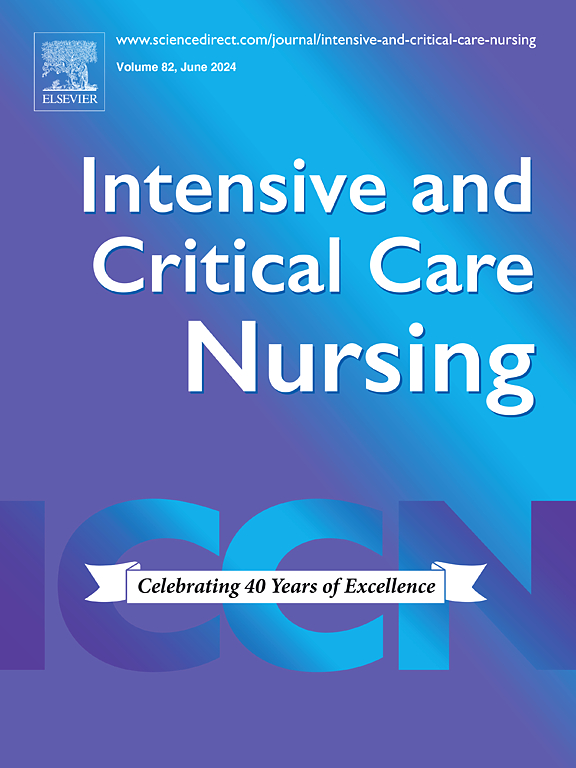Expert consensus on research priorities for the prevention of delirium in adult ICU patients
IF 4.7
2区 医学
Q1 NURSING
引用次数: 0
Abstract
Objective
To identify research priorities for the prevention of delirium in adult intensive care unit (ICU) patients.
Research Methodology
We conducted an iterative, consensus-based modified Delphi methodology combined with initial literature search to establish a prioritized research agenda. As a first round of an anonymised modified Delphi procedure, a 10-member international expert panel, selected on basis of their academic and clinical expertise, were asked to add topics they perceived missing from a list of potential research gaps regarding ICU delirium prevention. In the second round, experts rated each topic research priority using a 4-point Likert scale (very low to very high). Topics were considered a research priority if rated ‘high’ or ‘very high’ by at least 80% of experts. A third round to establish a top 3 was planned if more than 10 priorities were identified.
Main Outcome measures
Research priorities for delirium prevention in adult ICU patients.
Results
The evidence-based list comprised 44 potential research priorities with experts suggesting 9 additional topics. Of the 53 potential research priorities, 8 were unanimously rated as research priorities: ‘early mobilization’, ‘exercise interventions’, ‘sedation breaks for ventilator weaning’, ‘routine delirium surveillance’, ‘cognitive training/exercise’, ‘reducing light, noise, and care activities at night’, ‘open visiting hours’, and ‘family participation’.
Conclusions
We have identified 8 research priorities for delirium prevention in adult ICU patients.
Implications for Clinical Practice
The research agenda developed in this study provides direction for future investigations into delirium prevention in ICU patients. By highlighting expert-endorsed priorities, it supports a more focused allocation of research efforts and funding. The findings may inform the development of targeted, evidence-based prevention strategies, ultimately contributing to improved clinical outcomes in critical care settings.
专家就预防成人ICU患者谵妄的研究重点达成共识
目的确定成人重症监护病房(ICU)患者谵妄预防的研究重点。研究方法我们采用了一种迭代的、基于共识的修正德尔菲法,结合最初的文献检索来建立一个优先的研究议程。作为匿名修改德尔菲程序的第一轮,一个由10名国际专家组成的小组,根据他们的学术和临床专业知识选择,被要求在关于ICU谵妄预防的潜在研究空白列表中添加他们认为缺失的主题。在第二轮中,专家使用4分李克特量表(从非常低到非常高)对每个主题的研究优先级进行评级。如果被至少80%的专家评为“高”或“非常高”,则被认为是研究重点。如果确定了10个以上的优先事项,计划进行第三轮评选,以确定前3名。主要结局指标:成人ICU患者谵妄预防的研究重点。结果基于证据的清单包括44个潜在的研究重点,专家建议了9个额外的主题。在53个潜在的研究重点中,有8个被一致评为研究重点:“早期动员”、“运动干预”、“呼吸机脱机时的镇静休息”、“常规谵妄监测”、“认知训练/锻炼”、“减少夜间光线、噪音和护理活动”、“开放探视时间”和“家庭参与”。结论我们确定了成人ICU患者谵妄预防的8个研究重点。本研究制定的研究议程为今后ICU患者谵妄预防的研究提供了方向。通过突出专家认可的优先事项,它支持更有针对性地分配研究工作和资金。研究结果可能为有针对性的、以证据为基础的预防策略的发展提供信息,最终有助于改善重症监护环境的临床结果。
本文章由计算机程序翻译,如有差异,请以英文原文为准。
求助全文
约1分钟内获得全文
求助全文
来源期刊

Intensive and Critical Care Nursing
NURSING-
CiteScore
6.30
自引率
15.10%
发文量
144
审稿时长
57 days
期刊介绍:
The aims of Intensive and Critical Care Nursing are to promote excellence of care of critically ill patients by specialist nurses and their professional colleagues; to provide an international and interdisciplinary forum for the publication, dissemination and exchange of research findings, experience and ideas; to develop and enhance the knowledge, skills, attitudes and creative thinking essential to good critical care nursing practice. The journal publishes reviews, updates and feature articles in addition to original papers and significant preliminary communications. Articles may deal with any part of practice including relevant clinical, research, educational, psychological and technological aspects.
 求助内容:
求助内容: 应助结果提醒方式:
应助结果提醒方式:


